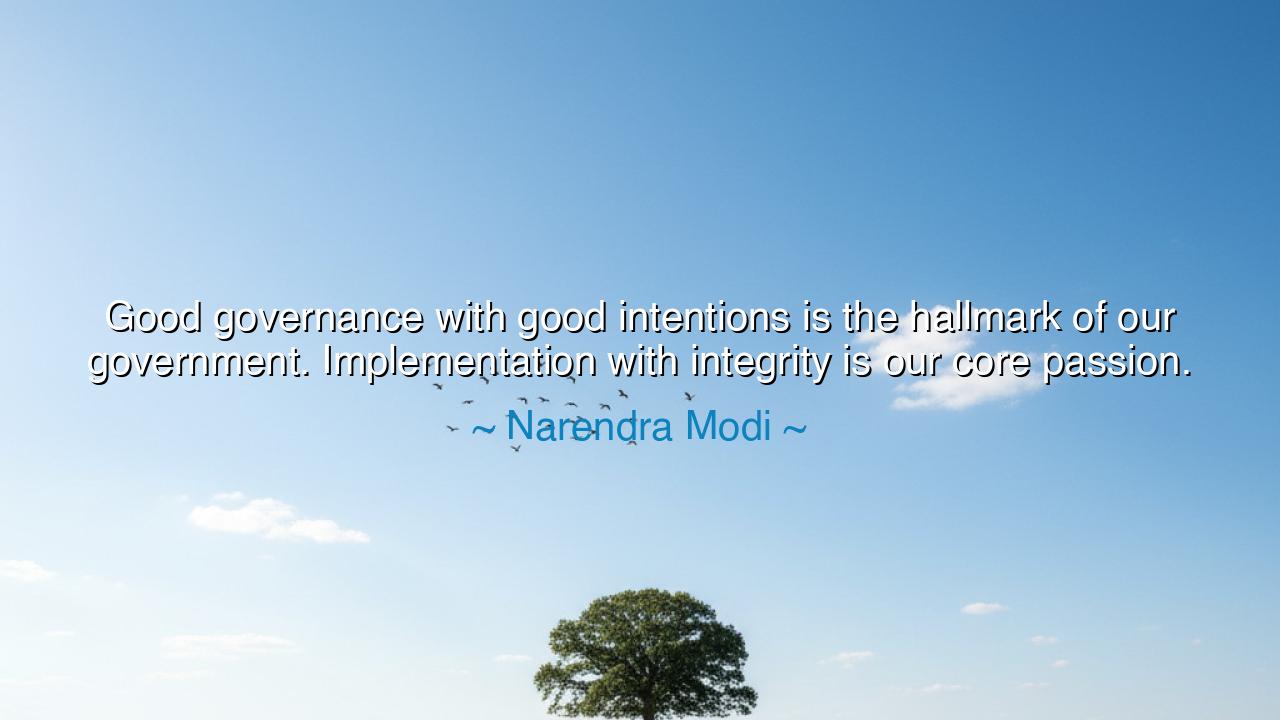
Good governance with good intentions is the hallmark of our
Good governance with good intentions is the hallmark of our government. Implementation with integrity is our core passion.






When Narendra Modi declared, “Good governance with good intentions is the hallmark of our government. Implementation with integrity is our core passion,” he was not merely speaking as a statesman — he was voicing a creed, a philosophy of leadership rooted in duty and moral strength. His words carry the resonance of ancient Indian wisdom — that dharma, or righteous conduct, must guide every act of governance. In these few lines lies a vision of a government not as a throne of power, but as a temple of service, where the measure of leadership is not wealth, control, or cunning, but integrity — the courage to act rightly even when none are watching.
The origin of this quote comes from the early years of Modi’s tenure as the Prime Minister of India, when he sought to redefine governance after decades of bureaucracy, inefficiency, and corruption. His emphasis was not only on reforming systems but on transforming the moral compass of those who governed. “Good governance,” to Modi, was not an administrative term — it was a moral vow, a sacred responsibility. He believed that good intentions must precede every policy, and honest implementation must follow every promise. Without the union of these two forces, even the most beautiful vision collapses into hollow rhetoric.
The meaning of his words reaches beyond politics into the heart of human leadership. For every system — whether it be a nation, a family, or a business — stands or falls not by its structures, but by the integrity of the people who serve within it. Good intentions ignite purpose, but implementation with integrity sustains it. Too often, leaders speak of noble dreams yet falter when faced with the temptation of ease, gain, or corruption. Modi’s statement reminds us that the greatness of governance lies not in speeches, but in deeds; not in the promise of reform, but in the relentless pursuit of truth and fairness in every decision.
History itself is filled with examples that echo this truth. Consider the reign of Ashoka the Great, who, after the horrors of the Kalinga War, transformed from a conqueror into a servant of peace. His governance, guided by compassion and honesty, became one of the most enlightened in history. He built hospitals, planted trees, and engraved his principles on stone pillars for all to read — a visible testament that leadership born of remorse and guided by righteousness can heal even the wounds of empire. In contrast, rulers who governed with selfish intent — who mistook authority for ownership — left behind not civilizations, but ruins.
Modi’s declaration also speaks to the modern struggle between idealism and pragmatism. In an age where cynicism has often replaced faith in institutions, he calls for a return to moral clarity — a belief that governance can still be pure, that honesty can still be powerful, and that service can still be sacred. His words remind the world that prosperity without ethics is fragile, and reform without integrity is meaningless. The machinery of the state may build roads and bridges, but only moral strength can build trust — and trust is the true foundation of progress.
Moreover, this vision of governance places responsibility upon every citizen, not just those in power. For a government’s virtue is a reflection of its people’s character. If citizens demand integrity, if they reject corruption in their daily lives, if they honor truth over convenience, then their leaders will rise to match that standard. As the old saying goes, “A nation’s destiny is written in the hearts of its people.” Thus, the quest for good governance begins not in parliaments, but in homes, schools, and hearts that value righteousness above gain.
The lesson of Modi’s words is timeless: power must serve, not rule; and leadership without integrity is but a shadow of greatness. Every generation must rekindle the fire of moral purpose in governance — to ensure that decisions are guided by compassion, not greed; that the public good outweighs private ambition; and that every action taken in the name of the people is worthy of their trust. Integrity is not an ornament of leadership — it is its foundation.
So let his words stand as a torch to those who would lead: Govern not for glory, but for good. Govern not with pride, but with purity. For when governance is rooted in good intentions and carried forth with integrity, it becomes more than administration — it becomes stewardship of the human spirit. And a nation thus governed does not merely prosper; it endures, noble and unbroken, as a testament to what righteous leadership can achieve.






AAdministratorAdministrator
Welcome, honored guests. Please leave a comment, we will respond soon